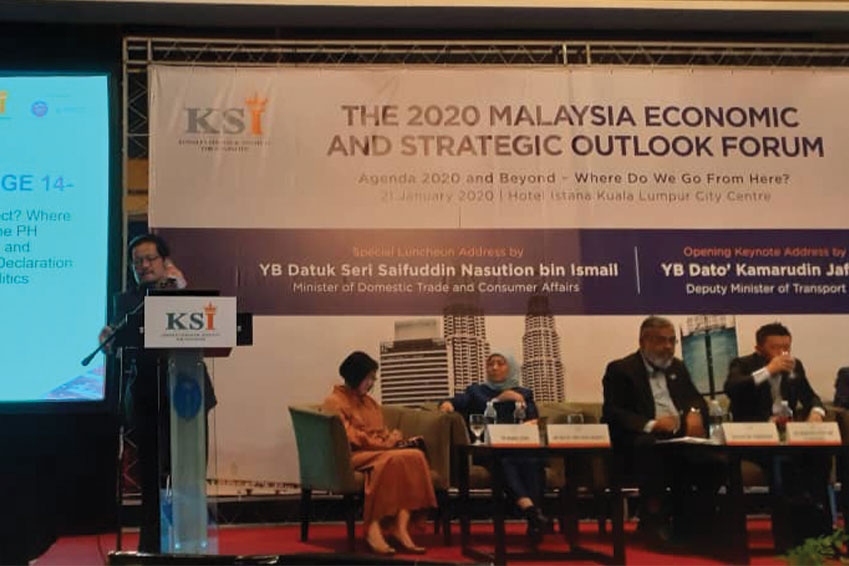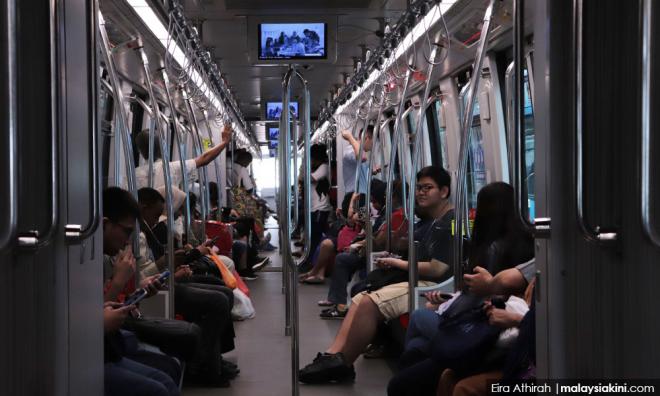
Published by Malay Mail.
This May, it will be two years Pakatan Harapan is helming the country. After two years of running the country, justifiably enough that the question to be asked is What’s next? And then what to expect? Followed by, where do we go from here?
There’ll be four important issues that Pakatan has to grapple with from now on. These are:
- The succession issue;
- The Perut Economy Issue or the bread and nutter Issue;
- Manifesto fulfillment; and
- The Shared Prosperity Vision 2030
The succession issue is a very important issue. The uncertainty over this issue may just cause some instability to the economy.
As it is, foreign investors and fund managers are now taking a wait-and-see attitude before committing their investments or funds to Malaysia. They want to see a certainty on the succession issue first.
In fact, the lacklustre performance of the Stock Exchange and the depreciation of the ringgit throughout most of 2019 can be primarily attributed to this issue, which affect the net inflow of funds into Malaysia.
It is thus of the utmost urgency that the succession issue be resolved before things get worse.
It’s very difficult to anticipate what to expect because of the unpredictability of the situation and the strong personalities involved. However, there are three possible scenarios here, namely:
- The succession will take place in May 2020;
- The succession will take place in December 2020, after the Apec meeting in November; or
- Prime Minister Tun Mahathir will continue to helm the country until GE15.
As long as any one of these scenarios take place with the full agreement and concurrence of both Tun Mahathir and Datuk Seri Anwar Ibrahim, there won’t be any uncertainty, and by extension, instability. What is important is that the agreed scenario must be quickly achieved and announced to the world to nip in the buds both uncertainty and instability.
This has to be resolved quickly in order to reassure the market so that the funds needed for achieving Shared Prosperity Vision 2030 can come into Malaysia fast and furious.
The key is to nip uncertainty in the bud. It doesn’t really matter whether the succession will take place in May or December or after GE15. What matters is the scenario decided and agreed upon by both Tun Mahathir and Datuk Seri Anwar must be quickly made known to the public to quell the uncertainty.
The Perut Economy or Bread and Butter Issues
The perut economy or bread and butter issues have been found to be the issues that have kept the rakyat worrying and indirectly, may affect their level of satisfaction towards the government.
Once the level of satisfaction of the rakyat changes by going south, it means regime change is in the offing.
From our Inagural Poll which EMIR Research conducted late last year, the five major issues which top the worry list of the rakyat are all bread and butter issues such as:
- Mitigating costs of living;
- Enhancing the quality of living;
- Creating credible jobs;
- Ensuring affordable homes; and
- Enabling affordable healthcare.
These five issues have contributed to a National Worry Index (NWI) of 0.77 which denotes a marginally maximum worried rakyat.
And these five worrying issues can be addressed if the government focus their attention on fulfilling the promises contained in its manifesto during GE14. This is because the majority of the manifesto promises are geared toward addressing these bread and butter issues.
Manifesto fulfillment
Pakatan needs to start focusing on delivering rigorously the remaining promises as contained in the manifesto which was made prior to GE14.
First, it needs to map out the deliverables against the ministry and make it a KPI (key performance indicator) of each of the ministries to deliver in a timely manner.
Yes, policies and their KPIs do take time to bear result but if it these are implemented now, there’ll be three years to GE15 for these to bear fruits.
Perhaps Pakatan can start with promises that may not have costs considerations. People are really hoping to see a monumental change.
It’s possible that three years can make the difference but the window will be closed fast enough if Pakatan continues to dilly dally on manifesto fulfilment.
In the same poll that we had conducted, the slow pace of manifesto fulfillment had contributed towards a Government Satisfaction Index (GSI) of 0.53 which denotes an average satisfaction of the rakyat towards the government.
In the present quarter (Jan-March), EMIR Research will be conducting another poll and hopefully this time around the NWI will move down two notches below to a better position of moderate worry, and the GSI moves up one notch to a better position of above average satisfaction.
Shared Prosperity Vision 2030
Some say the SPV 2030 is formulated to make up for the failure to achieve the lofty aspirations of Vision 2020.
In the words of Prime Minister Tun Mahathir Mohamed, “over the past decade, the country’s economic management has been radically entrenched towards premature liberalisation and this has led to the ambition of becoming a developed nation as envisaged in Vision 2020 not being fully realised.
“Nevertheless, being a high-income country does not guarantee fair and equitable distribution of wealth and income to the rakyat. In reality, despite the increase in value of the gross domestic product (GDP) and the country’s income, the benefit of the country’s wealth cannot be enjoyed equally by all.
“This is due to the relatively constant increase in income without the significant increase in productivity, leading to the rising cost of goods and services, thus burdening the lower income group. As a result, the increase in the rakyat’s income does not increase their purchasing power.”
So, a new approach is now adopted which hopefully will strengthen the country’s economic performance. The initiatives that will be introduced in this new approach will ensure that the rakyat and the nation enjoy Shared Prosperity.
The result – an aspiration that will see Malaysia become a harmonious and united nation with the country’s prosperity being shared in a fair and equitable manner by all regardless of ethnicities, class or regional differences – a country that cannot be forever trapped in the middle-income category.
My take on the SPV is that it also needs to address and focus on the solution for what appears to be the underlying structural and macroeconomic imbalances that seems to have inhibited the economy from performing efficiently.
For example, in the field of agriculture, why is that when there is an increasing demand for local produce, there seems to be difficulties in engineering a corresponding increase in the supply to meet the increased demand?
There must be some underlying structural and macroeconomic imbalances for this state of affair that the SPV must get to the bottom of the problem.
Similarly, when the SPV aims at increasing the employee share of GDP from 36 to 48 per cent so as to be roughly what it is in Singapore (39.7 per cent), South Korea (45.7 per cent) and Germany (51.5 per cent), it must realise that for Malaysia to achieve a target of 48 per cent would require the country to shed its reliance on commodities and low technology.
However, currently high technology is adopted by only 37 per cent of the manufacturing sector and 20 per cent of the services sector. This means that the adoption of high technology is not extensive enough. Why is this so? Are there some structural and macroeconomic imbalances responsible for this state of affairs? The SPV should go deeper into this.
This article was adapted from the presentation made by the director of Media and Communications of EMIR Research, Jamari Mohtar at The 2020 Malaysia Economic and Strategic Outlook Forum.
EMIR Research is an independent think tank focused on strategic policy recommendations based on rigorous research.

